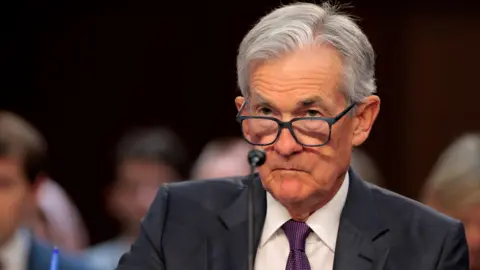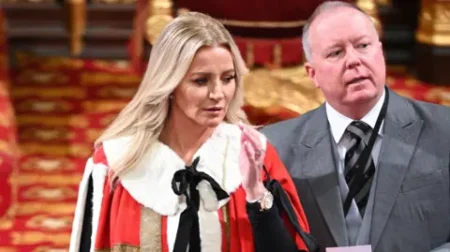On July 16, 2025, President Donald Trump made public statements regarding Jerome Powell, the Chair of the U.S. Federal Reserve, stating it is “highly unlikely” he would take the step of firing him. This announcement came shortly after Trump had discussions with Republican lawmakers about the possibility of dismissing Powell, raising concerns in the financial markets. Following these rumors, both stock market indices and the value of the dollar saw a decline, illustrating the significant impact of political discourse on economic stability.
For context, Trump has long been a vocal critic of Powell’s management of U.S. monetary policy. The President has consistently expressed frustration with interest rates set by the Federal Reserve, which he believes should be lower to stimulate growth in the economy. His discontent reached a peak with a series of pointed remarks, where he did not shy away from labeling Powell’s performance as “lousy.” Despite these criticisms, Trump emphasized that while he is not ruling out a possible firing of Powell, it is highly improbable unless warranted by serious issues like fraud.
The Federal Reserve operates independently from the executive branch, a structure that is intended to protect it from political pressures. This separation of powers often ensures that monetary policy decisions remain stable and based on economic indicators rather than political whims. Powell himself has reiterated that the White House does not have direct authority to terminate him solely for policy disagreements. He pointed out that while a chair can be removed, it is typically for specific justifiable causes that extend beyond mere differences in economic strategy.
Interestingly, Powell’s position has been showcased and scrutinized, especially given that he was appointed by Trump during the previous presidential term. This dynamic further complicates the relationship between the White House and the Federal Reserve, as the President’s insistence on lower interest rates is juxtaposed against Powell’s mandate to pursue economic stability and control inflation. The situation serves as a reminder of the entwined yet distinct roles of federal monetary authorities and the political landscape.
Amid discussions surrounding economic policies, Trump’s behavior regarding Powell reflects a broader tendency among political leaders to seek leverage over monetary policy decisions. Such interference raises essential questions regarding the independence of financial institutions and the potential consequences that could arise from politically motivated actions. Market investors are particularly sensitive to shifts in government stance because such changes can lead to volatility in financial markets, as evidenced by the immediate reactions of both the stock market and currency value to Trump’s remarks.
Moreover, with elections approaching, decisions made by figures like Trump regarding monetary policy could have amplified ramifications. For investors, understanding the motivations and statements of political leaders becomes crucial in making informed decisions. The backdrop of financial market reactions emphasizes the importance of stable and predictable monetary policy free from partisan politics.
In summary, Trump’s recent commentary casts uncertainty on the future of Jerome Powell’s tenure as Federal Reserve Chair, while also underscoring the historical tension between Washington and the independent financial institution. With the economy’s health at stake, the implications for interest rates and overall economic policy naturally become focal points in political discourse, highlighting the delicate balance that must be maintained for sustainable growth and stability in the financial landscape.











